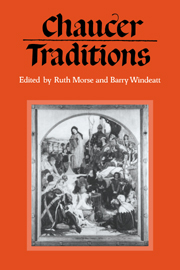Book contents
- Frontmatter
- Contents
- List of contributors
- Preface
- Note on the text
- 1 Chaucer traditions
- 2 Gower–Chaucer's heir?
- 3 Chaucer and Lydgate
- 4 Hoccleve and Chaucer
- 5 Chaucer and fifteenth-century romance: Partonope of Blois
- 6 Some Chaucerian themes in Scottish writers
- 7 The planetary gods in Chaucer and Henryson
- 8 Gavin Douglas: ‘Off Eloquence the flowand balmy strand’
- 9 Skelton's Garlande of Laurell and the Chaucerian tradition
- 10 Chaucerian metre and early Tudor songs
- 11 Aspects of the Chaucerian apocrypha: animadversions on William Thynne's edition of the Plowman's Tale
- 12 The shape-shiftings of the Wife of Bath, 1395–1670
- 13 The genius to improve an invention: transformations of the Knight's Tale
- 14 From the Clerk's Tale to The Winter's Tale
- 15 The Virtuoso's Troilus
- 16 Rewriting romance: Chaucer's and Dryden's Wife of Bath's Tale
- 17 Chaucer's religion and the Chaucer religion
- 18 A list of the published writings of Derek Brewer
- Index
9 - Skelton's Garlande of Laurell and the Chaucerian tradition
Published online by Cambridge University Press: 23 September 2009
- Frontmatter
- Contents
- List of contributors
- Preface
- Note on the text
- 1 Chaucer traditions
- 2 Gower–Chaucer's heir?
- 3 Chaucer and Lydgate
- 4 Hoccleve and Chaucer
- 5 Chaucer and fifteenth-century romance: Partonope of Blois
- 6 Some Chaucerian themes in Scottish writers
- 7 The planetary gods in Chaucer and Henryson
- 8 Gavin Douglas: ‘Off Eloquence the flowand balmy strand’
- 9 Skelton's Garlande of Laurell and the Chaucerian tradition
- 10 Chaucerian metre and early Tudor songs
- 11 Aspects of the Chaucerian apocrypha: animadversions on William Thynne's edition of the Plowman's Tale
- 12 The shape-shiftings of the Wife of Bath, 1395–1670
- 13 The genius to improve an invention: transformations of the Knight's Tale
- 14 From the Clerk's Tale to The Winter's Tale
- 15 The Virtuoso's Troilus
- 16 Rewriting romance: Chaucer's and Dryden's Wife of Bath's Tale
- 17 Chaucer's religion and the Chaucer religion
- 18 A list of the published writings of Derek Brewer
- Index
Summary
Of all the English Chaucerians nobody wrote more about poetry, about the nature of the poetic tradition, and his own role in it than Skelton, and The Garlande of Laurell is in many ways his most considered statement. Usually his comments appear in the context of some other subject, but this poem is about poetry and nothing else. For all that, it is not a particularly unified or cohesive performance, partly due to the circumstances of its composition. From the astrological opening (xxi, 1–7) it would seem that Skelton began the poem in 1495 on the occasion of a celebration at Sheriff Hutton Castle (Yorkshire) organized by Elizabeth Tylney Howard, Countess of Surrey, and her circle, to mark Skelton's laureations by three universities – Oxford in 1490, Louvain in 1492, and Cambridge in 1493. But the revised version published by Richard Fakes on 3 October 1523 included a defence of Phyllyp Sparowe (lines 1261–1366) which must post-date 1509 and a list of works including some which date from the early 1520s. In a sense, this is not unusual: Skelton's poems frequently grow by addition and augmentation. What is important in relation to The Garlande of Laurell, however, is that by 1523 its original celebratory purpose had waned somewhat, and it had become rather a retrospective review of a lengthy career spent on poetry, and an attempt at justifying that career.
In view of its subject matter, it is a less complacent poem than it might have been.
- Type
- Chapter
- Information
- Chaucer TraditionsStudies in Honour of Derek Brewer, pp. 122 - 138Publisher: Cambridge University PressPrint publication year: 1990



